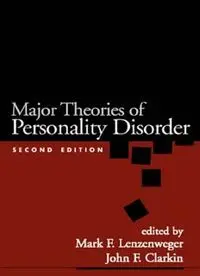
Major Theories of Personality Disorder PDF
Preview Major Theories of Personality Disorder
Major Theories of Personality Disorder ¢ ¢ ¢ This page intentionally left blank Major Theories of Personality Disorder ¢ ¢ ¢ SECOND EDITION edited by Mark F. Lenzenweger John F. Clarkin THE GUILFORD PRESS New York London © 2005 The Guilford Press A Division of Guilford Publications, Inc. 72 Spring Street, New York, NY 10012 www.guilford.com All rights reserved No part of this book may be reproduced, translated, stored in a retrieval system, or transmitted, in any form or by any means, electronic, mechanical, photocopying, microfilming, recording, or otherwise, without written permission from the Publisher. Printed in the United States of America This book is printed on acid-free paper. Last digit is print number: 9 8 7 6 5 4 3 2 1 Library of Congress Cataloging-in-Publication Data Major theories of personality disorder / edited by Mark F. Lenzenweger, John F. Clarkin.—2nd ed. p. cm. Includes bibliographical references and index. ISBN 1-59385-108-1 (hardcover: alk. paper) 1. Personality disorders. I. Lenzenweger, Mark F. II. Clarkin, John F. RC554.M24 2005 616.85′81–dc22 2004019448 About the Editors Mark F. Lenzenweger, PhD, is Professor of Clinical Science, Cognitive Psy- chology, and Behavioral Neuroscience in the Department of Psychology at the State University of New York (SUNY) at Binghamton and Adjunct Pro- fessor of Psychology in Psychiatry at the Weill Medical College of Cornell University, New York City. He also directs the Laboratory of Experimental Psychopathology at SUNY–Binghamton, where he conducts research and teaches on personality disorders, schizophrenia, schizotypy, and statistical methods. John F. Clarkin, PhD, is Professor of Clinical Psychology in Psychiatry at the Weill Medical College of Cornell University and Director of Psychology and Co-Director of the Personality Disorders Institute at New York– Presbyterian Hospital. His academic writing and research have focused on the phenomenology of the personality disorders and the treatment of patients with borderline personality disorder. v This page intentionally left blank Contributors Aaron T. Beck, MD, Department of Psychiatry, University of Pennsylvania, Philadelphia, Pennsylvania; Beck Center for Cognitive Therapy, Bala Cynwyd, Pennsylvania Lorna Smith Benjamin, PhD, Department of Psychology, University of Utah Neuropsychiatric Institute, Salt Lake City, Utah Eve Caligor, MD, Department of Psychiatry, Columbia University College of Physicians and Surgeons, New York, New York; Columbia University Center for Psychoanalytic Training and Research, New York, New York John F. Clarkin, PhD, Department of Psychiatry, Weill College of Medicine of Cornell University, New York, New York; Personality Disorders Institute, New York–Presbyterian Hospital, White Plains, New York Richard A. Depue, PhD, Laboratory of Neurobiology of Temperament and Personality, Cornell University, Ithaca, New York Seth D. Grossman, PhD, Institute for Advanced Studies in Personology and Psychopathology, Miami, Florida Otto F. Kernberg, MD, Department of Psychiatry, Weill College of Medicine of Cornell University, New York, New York; Personality Disorders Institute, New York–Presbyterian Hospital, White Plains, New York; Columbia University Center for Psychoanalytic Training and Research, New York, New York Mark F. Lenzenweger, PhD, Department of Psychology, State University of New York at Binghamton, Binghamton, New York; Department of Psychiatry, Weill College of Medicine of Cornell University, New York, New York vii viii Contributors Björn Meyer, PhD, School of Psychology and Therapeutic Studies, University of Surrey Roehampton, Whitelands College, London, England Theodore Millon, PhD, DSc, Institute for Advanced Studies in Personology and Psychopathology, Miami, Florida; Department of Psychology, University of Miami, Miami, Florida; Department of Psychiatry, Harvard Medical School/ McLean Hospital, Belmont, Massachusetts Paul A. Pilkonis, PhD, Department of Psychiatry, Western Psychiatric Institute and Clinic, Pittsburgh, Pennsylvania; Department of Psychiatry, University of Pittsburgh School of Medicine, Pittsburgh, Pennsylvania Aaron L. Pincus, PhD, Department of Psychology, The Pennsylvania State University, University Park, Pennsylvania James L. Pretzer, PhD, Department of Psychiatry, Case Western Reserve University, Cleveland, Ohio; Cleveland Center for Cognitive Therapy, Beachwood, Ohio Preface Nearly 10 years have passed since we published the first edition of Major Theories of Personality Disorder. The ensuing decade has been an exciting one indeed with respect to the advances that have occurred in our under- standing of the fundamental nature of personality disorders as well as their treatment. In assembling the second edition of Major Theories, as many of our colleagues refer to this volume, we invited all our original contributors to revise, amend, and extend their original position pieces in light of the advancing empirical literature in personality disorders research. We also invited them to offer their most recent thoughts and creative ideas with respect to their own theories of personality disorder. We encouraged all of our contributors to “take risks,” as it were, and to again advance novel propositions within the context of their models as they saw fit. We are excited to note that all of the chapters that were included in the first edition of Major Theories have been substantially revised and updated for this edi- tion; some chapters were nearly completely rewritten. Thus, the second edi- tion contains much that is new and intellectually stimulating. Moreover, we have added two new chapters to the second edition, namely, an additional chapter on interpersonal theory by Aaron Pincus and a chapter on an attachment model of personality disorders by Björn Meyer and Paul Pilkonis. These chapters were added to further expand the richness of the interpersonal perspective that is quite central to the basic nature of person- ality disorders. As we did earlier, we continue to view each of the theoretical models in this volume as a research heuristic, a stimulus for both further theory/ model development and empirical research. No comprehensive and inte- grated model of personality disorder exists; however, we believe the fertile models presented in this volume along with recent advances in research strategy will move the field closer to such a model in the coming years. ix
